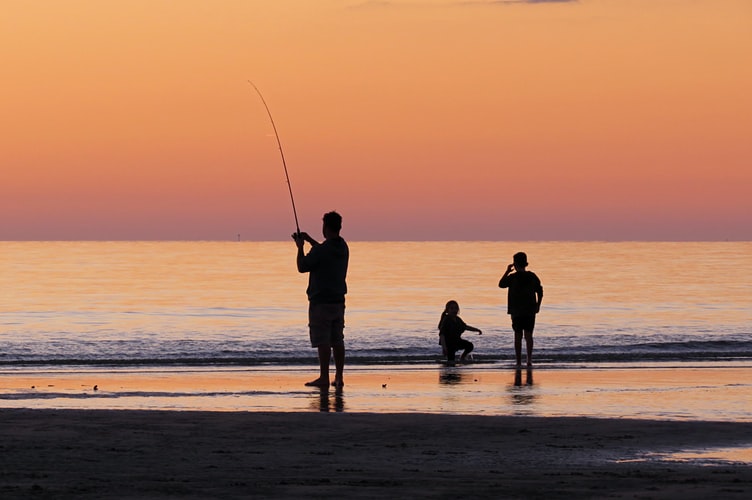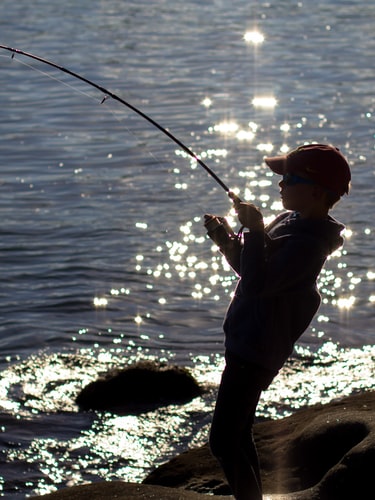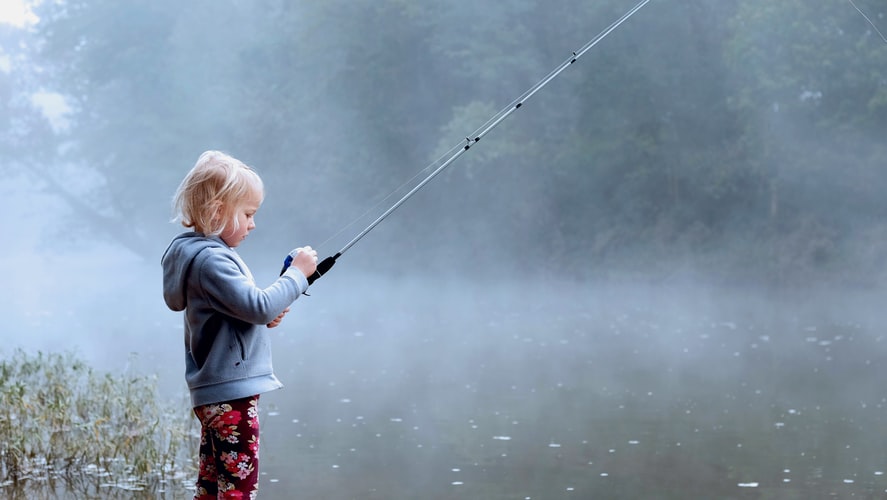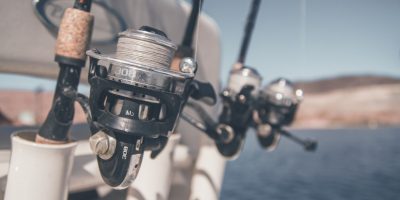For many people, fishing is not just a hobby; it is a passion and a lifestyle. It is no wonder that many avid fishers want to introduce their kids to fishing as soon as they are old enough to handle a rod and reel. Most parents would ask, do I need a fishing license to take my son fishing? It is crucial to comply with local fishing and wildlife laws to ensure you have a hitch-free, fun outdoor adventure. When it comes to fishing, different laws apply to different locations.
Regulations in different locations- do I need a fishing license to take my son fishing?

Matters can be a little complicated since there isn’t one answer to the question: do I need a fishing license to take my son fishing? The rules about fishing licenses are different in each state. For example, in Texas, no one under 17 must have a fishing license according to fishing regulations on the Texas Parks and wildlife hunting site. But in Oregon, kids between the ages of 12 and 17 will require a youth license for fishing. This is according to the Oregon Department of fish and wildlife. Licenses will depend on where you live.
Do I need a fishing license to take my son fishing? To know exactly what rules apply to your state, check out the info on the state and territorial fish and wildlife offices available on the US Fish and wildlife websites. You will discover information about the laws and requirements for licenses in your area as well as instructions on where to purchase a fishing license. In most cases, licenses can be bought online.
Fishing license
Do I need a fishing license to take my son fishing? Ensure that you and your kids have the correct fishing license. It may be a bit of a hassle, but these small pieces of documents do some good. And in 2000, fishing licenses were able to generate $700 million of income across the country. This info is according to the US Fish and Wildlife Service website. All of these funds were utilized for conservation and restoration efforts so getting a fishing license is a good way to do your part in protecting natural resources. Do I need a fishing license to take my son fishing? If you do your part, this means that your children and coming generations will have plentiful fishes to catch in the years to come.
Updating the license
Do I need a fishing license to take my son fishing? If you want to avoid updating your kids’ fishing license each year, you may want to look at some lifetime fishing licenses available. In the state of California, you can get a one-time payment of $550, which gives your child under 10 a fishing license for a lifetime. This info is according to the California Department of Fish and wildlife website. You will get a sport fishing license every year, which is a good deal for kids whose families love to fish. Do I need a fishing license to take my son fishing? You might want to check out your state’s details for comparable offers.
Teaching a kid how to fish

Do I need a fishing license to take my son fishing? But obtaining the correct license is the easy part when it comes to fishing with your child. The task of instructing your child how to Line without getting tangled is the hard part. In the process of teaching, prepare to lose line and perhaps damage a rod or two in those initial outings. But it is a small price to pay for the enjoyment of sharing your passion with your kid. Obtain a fishing license for your child is only a small step towards plenty of shared experiences and memories in the wild outdoors.
Who Needs a Fishing License? — do I need a fishing license to take my son fishing?
In Iowa’s state, all anglers who are 16 years and older must obtain a fishing license. In contrast, anglers under the age of 16 may fish without carrying a license. Do I need a fishing license to take my son fishing? They are allowed to keep their own quota of fish. But when fishing trout, their quota must be shared with an adult who has a license or purchase their own trout fee to keep their own catch.
Do I need a fishing license to take my son fishing? Licenses can be purchased on several occasions and even online.
Fishing Regulations
When it comes to the number and size of fish you want to catch, there are limits, especially for certain species.
Safety Tips
It is crucial to bring a first-aid kit with all the essentials such as bandages, insect repellent, tweezers, and analgesic cream.
Get a wide-brimmed hat and sunglasses to keep the UV rays out of your child’s eyes and off their faces. As much as possible, avoid fishing at high noon.
Wearing life jackets is recommended for children fishing in deep or fast-moving water. Make sure that the lifejacket can fit your child snugly and doesn’t loosen.
Teaching a Kid to Fish– do I need a fishing license to take my son fishing?

When you have a chance to instruct your kid how to fish make sure to follow some tips to ensure that they will enjoy the activity as much as you do.
Suppose you have begun handling a cane pole or a miniature rod and reel combo as a child. You may have had memories hanging around with your dad, uncle, or grandfather. As a child, you may even have caught a fish or two. You got addicted, and you want to fish ever so often.
Studies reveal that people who fish regularly were first acquainted with the sport at the age of 12. Many children are taught how to fish by an older family member.
Now that you’re an adult, perhaps you want to get back by introducing your child to the enjoyment of fishing. You want them to feel the joy in fishing and the struggles of trolling.
Common questions kids ask about fishing– do I need a fishing license to take my son fishing?
The subjects that come up on a fishing trip with your child can be funny and yet thought-provoking. The following are some common questions kids asked and the answers.
How are fish able to breathe?
Fish have gills instead of lungs where they take in oxygen from the water the same way human lungs take oxygen from the air.
Do the fish also need to sleep?
Yes, some fish do sleep, but a majority of them just rest. You are not able to tell what the fish is doing either because they do not have eyelids.
Where did the fish come from?
Most fish are born from eggs that hatch every spring. They may not look like older fish in the first few weeks and may be too tiny, so it is extremely hard to see them. Fish can lay up to a million eggs to increase the chances of fish surviving and growing up.
How do fish keep warm?
Fish are cold-blooded creatures, and their body and blood temperatures shift with the temperature of the water they are swimming in. In contrast, people are warm-blooded, and human body temperature doesn’t change much. Humans need to wear coats and hats to keep cozy during the winter while fish do not.
What keeps the fish from sinking?
Many fish will have a balloon-like sac on their bodies, which is otherwise known as a swim bladder. The gases within the bladder prevent the body from sinking. Species of fish such as sharks don’t have this part so they have to swim at all times so they won’t sink.
How old do the fish get?
Some species of fish will only live for two years. Fish such as bass and sunfish can live for 16 years. Catfish and carp have long lives and can live for 20 to 40 years. Sturgeon have the longest lifespan and can live up to 100 years.
How large can fish get?
Some saltwater fish types like sharks can weigh up to thousands of pounds. In freshwater bodies, the largest fish are sturgeon, which can get bulked up to 1000 pounds. Trophy catfish can be as long as a fully grown person is tall and weigh 100 pounds. Trophy sunfish is aren’t much larger than a person’s hand and only weigh a little more than a pound.
Top 9 tips in teaching your kid how to fish– do I need a fishing license to take my son fishing?
Start at home
Start fishing lessons at home, ideally days before the trip. Going on a visit to your local tackle shop with your child and allow the child to be part of the entire process of choosing tackle and ask around for a good location to go fishing. You may also visit the local library to check out books and references on fishing to get started on teaching a kid how to fish.
Practice on land
You can teach your kid to tie knots, and set bobbers right in the comfort of your home or in larger areas such as the park. Choose a location where wayward casts will not be caught in on tree branches or bushes. In the excitement of catching fish knots and bobbers may get tangled.
Get basic equipment for your kid
Get basic rods for first-timers, especially for very young anglers. It allows simple spin-casting tackle, such as the special models offered by several tackle manufacturers. Give them the freedom to have their own tackle box to store their own hooks, bobbers and sinkers.
Trade your fishing tackle for a camera
When you leave your tackle at home, you’re more likely to stay involved in your child’s practice and less tempted to get caught up in fishing yourself. When you have a camera, you can record the activities of the day, including that great moment when your child catches their first fish.
Give the boat a rest
Rivers and lakes are a perfect place to fish that offers tons of easily caught panfish such as bluegill, crappie, or perch. Locations such as docks and peers are great places to start because they do not have many trees and other obstacles that can snag casts. They also have structures that give underwater cover for fish. Fishing in open shoreline areas such as ponds, lakes, and slow-moving streams are also ideal. In these instances, boats can be used, but it should be noted that kids will require elbow room as well as wiggle room when they fish. They might feel confined when they have to be firmly seated on a boat for long periods.
Use living bait to catch fish
Nothing lures panfish more easily than live baits such as worms and crickets. The primary goal of these first fishing outings is to be able to catch fish to keep a child’s involvement in fishing. Thus, it is crucial to collect bait that can crawl and swim. Live baits are also stimulating for the child to play with. They should touch the bait when the fishing gets boring or slow, so they have something to occupy their attention.
Use a bobber
Nothing is as exciting to a child as a bobber spinning on the water surface, especially when the child knows what is causing it. The bobber also gives casting weight, which allows the child to see extremely well and feel when something strikes. Bobbers keep the bait away from the bottom and far from underwater snags.
Be prepared to scout
Always be prepared and take plenty of snacks and drinks with you. Bring various baits and make sure that you have a rain jacket and insect repellent handy. You want your child to be as comfortable as possible before and after the fishing session.
Keep sessions short
When your kid says they want to go home, you must follow them. You want your child to have good memories of these first trips and want them to have fun. If it isn’t fun anymore for the child, you must end the session even if the fish are biting, and it is still early.
Final thoughts
If you are a passionate angler, you may want to pass on this skill to your child. However, to protect wildlife and natural resources, some locations and areas may have rules and regulations for fishing. Do I need a fishing license to take my son fishing? For every age, there are regulations and laws applicable. You must check specific state laws in your area to make sure that you are complying.


